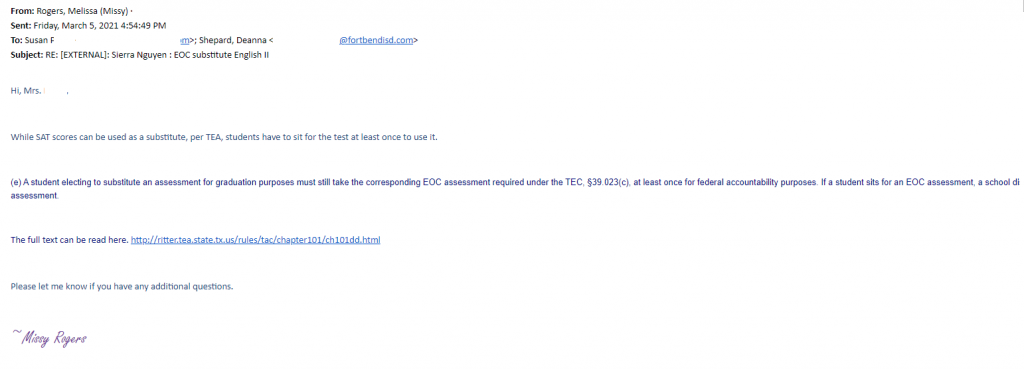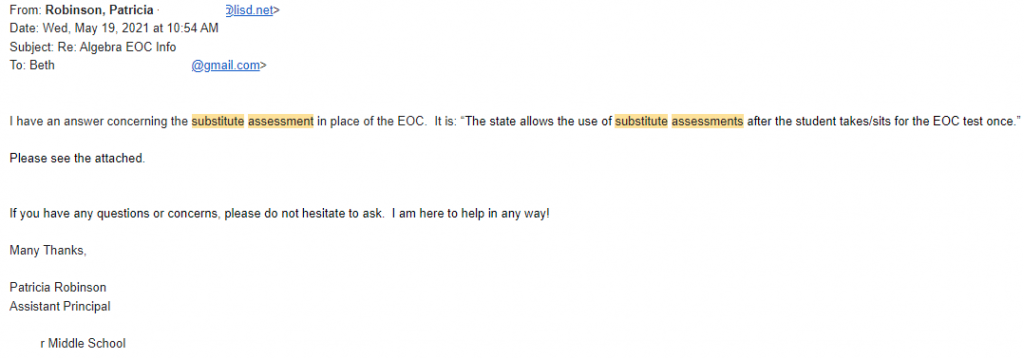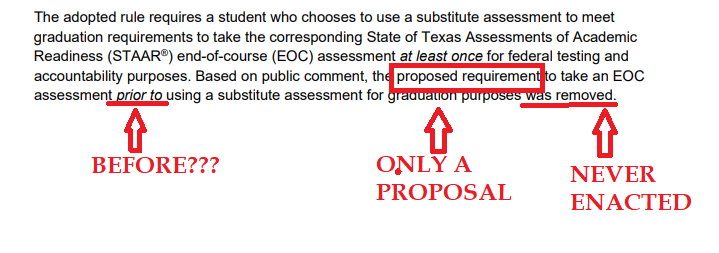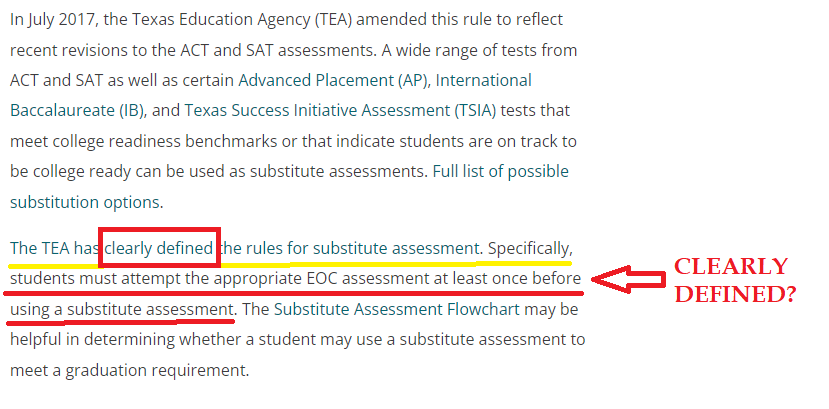Ignorance or Deliberate Lies? Schools and Sub Assessments
When the Texas legislature imposed EOC graduation requirements on Texas students, they threw out a very important bone that Opt Out parents utilize to their advantage: the right to use substitute assessments to satisfy graduation requirements. This is a legislative determination and can’t be restricted by local schools or the TEA. The TEA is charged with making rules to determine qualifying assessments and scores and the process (consistent with the statute) to use them.
In fall 2019, the TEA proposed a rule that would have required a student to sit for and fail an EOC examination before using a substitute assessment to meet graduation requirements. Long story short, the rule was an ill advised attempt to address the federal Dept. of Education decision to no longer accept substitute assessments as meeting the federal assessment requirements. Of course, this has nothing to do with graduation, but the TEA thought by requiring the EOC before approving a substitute assessment for graduation, they would increase EOC participation.
We immediately fought back against the rule, because it dangerously conflated federal accountability requirements (that have never been tied to state graduation policies) with our own state law graduation requirements which expressly allow the use of substitute assessments. Based on TPERN’s call to action, parents, teachers and other activists flooded the TEA with comments against the rule. Most obviously, we pointed out that there is no need to restrict graduation access based on EOC attempts just to meet federal accountability. The proposed rule already said that a student who uses a sub assessment to graduate must still take the EOC for accountability purposes. There was no need to add a hammer by saying “and if you don’t you can’t graduate.”
When this was announced, we were up against the wall. The TEA had already started telling districts that this would be the rule and training them to enforce it. We immediately told parents to submit all qualifying sub assessment scores before the rule went into effect. That drove the districts crazy. They actually thought they could deny complying with the current law on the basis that it would change in the future. It was like talking to children who had never taken a civics class. We wrote nasty letters. We ended up getting school district lawyers writing us letters telling us not to contact their counselors! We responded of course that their counselors should not give false information if they did not want to be contacted. It was a done deal we were told over and over. But the letters our members sent got their attention.
A public hearing was held and several parents testified making these same points. Nobody showed up to defend the test first requirement. And when the new rule was published, the TEA agreed with us! They struck the language from the rule that said a student must attempt the EOC before being eligible to use a substitute assessment to meet graduation requirements.
Note where this language appears. This is the section of Commissioner’s Rule 100.4002, which sets out when a student is eligible to use a substitute assessment to satisfy EOC graduation requirements. They removed the language that says the student had to take the EOC at least once to be eligible. That’s gone. And no other language anywhere in the rule is tied to eligibility to use the sub assessment to satisfy graduation requirements. Everything else has to do with federal accountability, which is completely unrelated to state level graduation requirements. The rule on eligibility is unchanged from prior years.
 (Source: http://ritter.tea.state.tx.us/rules/tac/chapter101/ch101dd.html)
(Source: http://ritter.tea.state.tx.us/rules/tac/chapter101/ch101dd.html)
The removal of the prior attempt requirement was no mistake. The TEA recognized that they could simply ask sub assessment students to take the EOC for accountability reasons only regardless of the acceptance of the sub assessment for graduation purposes. They explicitly agreed that there was no need to add a prior attempt requirement when a different part of the rule (related to accountability not graduation) provided a means to assess students who have already met their graduation requirements by substitute assessment.
Source: https://tea.texas.gov/sites/default/files/20_02_101-4002.pdf
Not clear enough? In the section titled Reasoned Justification, this same adoption document is explicit:
The subsection that would have “require[d] students to take an EOC assessment . . . prior to being eligible to use a substitute assessment to meet graduation purposes” was “removed at adoption” because it was “not needed.” Simple enough, right? The TEA agreed with the parents, dropped the rule change and told the schools to handle accountability on the back end by giving the EOC to everyone, but that using substitute assessment for graduation was pretty much unchanged. What could be difficult about that?
Well as it turns out, almost everything. Because the TEA had spent much of the fall preparing districts for the new requirements (you know, the ones that were removed), the districts simply did not believe they had really gone away. Almost immediately, they began to deny acceptance of substitute assessments on the baseless ground that the student had to first sit for the EOC.
This situation was aggravated by the fact that the TEA failed to update it’s slide show on the new rule even after the amendments were made. We pointed that out to the TEA and they corrected that omission.
 Note what is also clearly stated in this email. “[S]tudents are NOT required to take a STAAR EOC assessment prior to using a substitute assessment to fulfill graduation requirements. That requirement was removed from the rule during rulemaking.” This clear statement expresses precisely what happened with the rule and the current state. Unfortunately, this kind of clear information is foreign to the TEA in its official communications.
Note what is also clearly stated in this email. “[S]tudents are NOT required to take a STAAR EOC assessment prior to using a substitute assessment to fulfill graduation requirements. That requirement was removed from the rule during rulemaking.” This clear statement expresses precisely what happened with the rule and the current state. Unfortunately, this kind of clear information is foreign to the TEA in its official communications.
Schools continued to insist that the proposed, rejected and outdated version of the rule was in force. There never was any such rule, there was only a failed proposal.
To address this, the TEA issued a “clarification” to the schools. While the clarification accurately states that “Based on public comment, the proposed requirement to take an EOC assessment prior to using a substitute assessment for graduation purposes was removed,” it does not state the obvious corollary: “students are NOT required to take a STAAR EOC assessment prior to using a substitute assessment to fulfill graduation requirements.” So many schools continued to insist that such a requirement existed. Some even said “still” existed, though no such requirement ever existed before, during or after rulemaking. It was proposed; it was rejected; it doesn’t exist and never did exist.
So the confusion continued. Just days after the clarification, we see this: Again, a lack of clear direction led to an inability of the district to understand that graduation purposes and accountability requirements are decoupled. They always have been in Texas. They never were linked. They just both used the same assessments to get to their end points. To her credit, Julie Cole at the TEA has been absolutely clear with districts that using substitute assessments for graduation is not related to taking the EOC for accountability. But still, the misinformation continues:
Again, a lack of clear direction led to an inability of the district to understand that graduation purposes and accountability requirements are decoupled. They always have been in Texas. They never were linked. They just both used the same assessments to get to their end points. To her credit, Julie Cole at the TEA has been absolutely clear with districts that using substitute assessments for graduation is not related to taking the EOC for accountability. But still, the misinformation continues:
 Why do schools continue to mislead parents about substitute assessment requirements? On the one hand, a large amount of blame lies with the TEA for training schools on a proposed rule that was ultimately not adopted. When the rule was actually adopted without the proposed change, there was no fireworks show on a level of the initial rollout to alert schools to the actual form of the adopted rule. So many just continued to use the process that was presented in the initial training. A clarification that did not use the same clear language that the TEA uses in emails did not help. However, at the same time, there is some amount of willful ignorance at play. Schools have always made claims about “requirements” and absolutes of STAAR if they felt it would motivate students to participate and try hard. Telling them they have to attempt STAAR first is just another instance of this. Some district even overtly lie and throw this nonexistent requirement onto their website. I’m looking at you Katy ISD – an embarrassment of a district that has been wedded to data obsession since the pathetic tenure of TEA-sycophant, Dr. Allison Matney. I’m looking at you Pine Tree ISD – spreading false information 9 months after the TEA clarification! And I am especially looking at you Round Rock ISD – for telling your parents and students the precise opposite of what the law and the TEA says. This deserves a special view:
Why do schools continue to mislead parents about substitute assessment requirements? On the one hand, a large amount of blame lies with the TEA for training schools on a proposed rule that was ultimately not adopted. When the rule was actually adopted without the proposed change, there was no fireworks show on a level of the initial rollout to alert schools to the actual form of the adopted rule. So many just continued to use the process that was presented in the initial training. A clarification that did not use the same clear language that the TEA uses in emails did not help. However, at the same time, there is some amount of willful ignorance at play. Schools have always made claims about “requirements” and absolutes of STAAR if they felt it would motivate students to participate and try hard. Telling them they have to attempt STAAR first is just another instance of this. Some district even overtly lie and throw this nonexistent requirement onto their website. I’m looking at you Katy ISD – an embarrassment of a district that has been wedded to data obsession since the pathetic tenure of TEA-sycophant, Dr. Allison Matney. I’m looking at you Pine Tree ISD – spreading false information 9 months after the TEA clarification! And I am especially looking at you Round Rock ISD – for telling your parents and students the precise opposite of what the law and the TEA says. This deserves a special view:
TEA Clarification:
 Julie Cole’s Clear Language:
Julie Cole’s Clear Language:
 If a district has any doubts, ask Julie and she will tell them straight:
If a district has any doubts, ask Julie and she will tell them straight:
 So how and why do sophisticated districts continue to get it wrong? Why am I so hard on RRISD especially? Because they prove my point that this isn’t confusion or innocent error. This is deliberate misinformation. Over the course of two years, I brought this error to the attention of the General Counsel of the Round Rock ISD after she had “forbidden” me from contacting their counselors directly. On the phone she acknowledged the effect of the rulemaking, but she steadfastly refused to do so in writing or to make any effort to change the misinformation on the district website. In fact, she never even responded to this March 2021 email – over a year after the TEA clarified its position and she and I had a verbal agreement on the matter.
So how and why do sophisticated districts continue to get it wrong? Why am I so hard on RRISD especially? Because they prove my point that this isn’t confusion or innocent error. This is deliberate misinformation. Over the course of two years, I brought this error to the attention of the General Counsel of the Round Rock ISD after she had “forbidden” me from contacting their counselors directly. On the phone she acknowledged the effect of the rulemaking, but she steadfastly refused to do so in writing or to make any effort to change the misinformation on the district website. In fact, she never even responded to this March 2021 email – over a year after the TEA clarified its position and she and I had a verbal agreement on the matter.
So, no, schools don’t innocently get this wrong. Not after two years and numerous corrections. The lies are deliberate and they are designed to do one thing: prevent parents and students from exercising their statutory rights to use substitute assessments to meet graduation requirements. If your district does this please report it to us and to Julie Cole at the TEA.
What do we propose that parents do when they have a qualifying substitute assessment score?
- Upon receiving a satisfactory substitute assessment score, submit it to the counselor with documentation of the score and a statement like this: [Name of Student] wishes to use this Substitute Assessment score to satisfy the EOC graduation requirements for [Name of Course]. Please let me know if you require any additional information to document this score. If not, please reply and acknowledge that [Name of Student] has satisfied the graduation assessment requirements for [Name of Course]. This substitute assessment is offered for graduation purposes only.”
- If they request further documentation, provide it with the same request for confirmation.
- If they talk about the accountability requirements, respond with something along these lines: “We are aware of the Commissioner’s rules regarding EOC assessment for accountability purposes. The question we asked, though, was for graduation purposes only. Please confirm that [Name of Student] has satisfied the graduation assessment requirements for [Name of Course]. Once we have received this confirmation, we will be prepared to discuss any accountability requirements that TEA imposes on the school.” Then you have to stand firm. Many schools say they will not confirm this until the student takes the EOC for accountability purposes. Parents cannot give into this, as this is simply the school trying to make the rule read like it was proposed, not as it was adopted. They must give you an answer on the graduation requirements. File a grievance if they don’t (BE TIMELY!) and do not sit for the assessment until they do.
- If they confirm graduation requirements, you can then do as you wish on the EOC for accountability purposes. The TEA is clear that a student showing up and refusing meets all accountability requirements. Do that if you wish. Or, since it is no longer high stakes, take it if you wish. Or, since accountability is not your concern, but the school’s, be absent if you like. Either way you go, the key is to have the graduation requirement confirmed before having any involvement with the accountability issue.
- Report any districts attempting to impose a prior EOC attempt requirement on the use of substitute assessment to us here at TPERN and to Julie Cole at the TEA!




